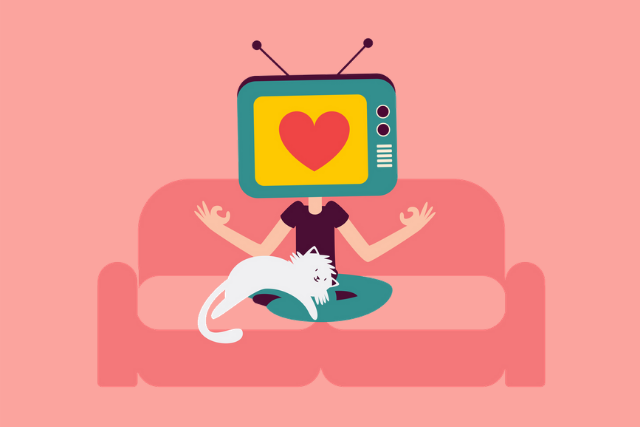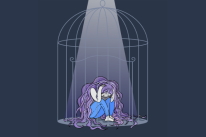
“I now see how owning our story and loving ourselves through that process is the bravest thing that we will ever do.” ~Brené Brown
I had just squeezed all my possessions into a jumbo-sized moving van and relocated to a teeny tiny apartment. I had landed a new job in a new city, and everything seemed peachy keen… at least, on the surface.
It was a fresh spring evening in 2015, and I’d spent the entire day trying to fit all my clutter into my new home. Picture this: my 350-square-foot attic had sloped ceilings, the world’s smallest kitchen, and basically zero storage—so as you can imagine, it was no easy feat.
As I played Tetris with all my kitchen gadgets, trying to make them fit into the cupboard under the sink, I grew increasingly frustrated. My chest began to burn, and a panic attack erupted so suddenly that I collapsed on the floor, gasping for breath between sobs.
It caught me totally off-guard. I mean, I was surrounded by things I’d purposefully picked out: I’d saved up for them, pined after them, and spent hours upon hours shopping for them. Why didn’t I feel at home in my new space?
Turns out, the real issue was that I didn’t feel at home in myself.
The process of decluttering did not come easily to me. I found myself super attached to seemingly mundane things—mugs I never used, dresses that didn’t fit, musical instruments I’d never bothered to learn—and in order to let them go, I had to dive deep into my own insecurities.
But it was in doing so that I finally found self-acceptance and discovered what was truly important to me.
Going through our belongings is so much more than simply asking “do I need it?” or “does it make me happy?” It entails being honest and vulnerable with ourselves—which, between you and me, was not something that I was comfortable with in my pre-cluttered life.
Decluttering requires us to work through some of our deepest fears. But if done right, it also gives us the power to cultivate radical self-love.
Here are three ways that choosing to let go of your clutter can help you find more self-acceptance.
1. You make peace with your truest self
There are some things we keep not for who we are, but for who we wish we were.
When I was in school, I bought a trumpet. I loved jazz and had this vision of myself blasting out high C’s like Louis Armstrong—but in reality, I never devoted much time to practicing. In fact, I barely learned how to make more than a fart noise with it.
Purchases we make for our “fantasy self” are generally aspirational and reflect the goals and dreams we have for ourselves. For you, it might look like…
- A pair of fancy shoes you bought thinking you’d wear them out to special occasions… but when those events roll around, you always reach for a comfier pair
- Loads of yarn that you swear you’ll use when you learn to knit one day, even though you just can’t seem to make the time for crafty hobbies
- A collection of classic novels that you just can’t seem to get into, even though you want to be the kind of person who can talk about Dickens and Tolstoy at parties
If there’s a disconnect between your fantasy self and your habits, these items are almost guaranteed to become clutter. Worse yet, they become clutter that makes you feel like crap for failing to be you’re not.
If you’ve been feeling guilty about not using your yoga mat or your pasta maker, consider this your official permission to let it go. It doesn’t mean that you’ll never reach those goals, it just means you aren’t in a place to make them happen… yet. And hey, if you decide that those aren’t the right goals for you at all, that’s 100% okay too!
Decluttering your fantasy self can free you up to be more at peace with your truest, most authentic self—which, in my opinion, is way cooler than any pasta maker, am I right?
2. You learn to trust in your resilience
Have you ever been nervous to get rid of something because you “might need it one day” in the future? Then you, my friend, might have just-in-case clutter.
When our homes are filled with stuff we keep “just in case,” it tends to be the result of a deep-seated fear of change. It’s our way of trying to be prepared for any possible scenario that life may throw at us, of trying to gain some semblance of control over every facet of our lives.
But here’s the thing: that’s just not how life works.
As hard as we try, we can never fully prepare for the infinite number of situations that might happen in our lives. So hanging onto that second stapler “just in case” the first one breaks is an attempt to control a future situation which may or may not ever happen. And when you multiply this mentality by hundreds—or even thousands—of items, it’s easy to see how our fear of the future can impact our homes.
Decluttering these items can help you release that need for control, and trust in your own resilience to overcome obstacles. So if you get rid of that second stapler, and years from now the first one does break, you can ask yourself:
- Is there something else I can use instead, like a paperclip?
- Does this document even need to be stapled in the first place?
- Who in my life has a stapler that I could borrow?
Decluttering those “just in case” items can help you sharpen your creative thinking and can even strengthen your bond with the community of friends, family, and neighbors around you.
3. You find more happiness in the present moment
I’ve yet to meet anyone who wasn’t sentimental about at least one thing they owned. And I totally get it! It can be a comforting feeling to be reminded of memories and people we’ve loved.
If you’re a sentimental sap like me, you probably have an urge to keep anything that has memories associated with it. The issue arises when our homes are filled with clutter from the past, and it prevents us from living fully in the present. And, let’s be real—living mindfully in the present is probably the key to a happy life, right?
Now, of course I’m not saying you need to ditch everything that reminds you of people or past events in your life. But if you’re looking to pare down your sentimental clutter, here are some things to keep in mind:
- There can sometimes be a fine line between fond memories and painful memories. Allow yourself to let go of things that bring up negative emotions or crappy experiences from the past.
- Getting rid of an item doesn’t mean you’re insensitive or that you don’t love the person that it reminds you of.
- You don’t need to keep a whole set of items to remember—you can choose your favorite or two, and it can serve the same purpose.
- If you want to part ways with a sentimental item but worry about losing the memory, you can always take a picture it. After all, your memories live in you… not your stuff.
It’s natural to feel some attachment to the past, but it doesn’t need to be at the expense of your living in the present. If your home is full of sentimental items, letting go of some of them could be the key to finding more happiness in your space.
—
As we declutter, we inevitably come face-to-face with our attachment to the past, our fantasy selves, and our future fears. By working through the emotions behind each, we can start to find a little more peace in the present moment—and, ultimately, in ourselves.
About Sara Brigz
Sara Brigz is a declutter coach who can’t wait to help you simplify your home, confront the emotions holding you back, and live a life you’re excited about. Her blog, Let That Shit Go, explores the root causes of clutter and how to overcome them for good. If you’re ready to find more calm in your home and mind, check out her free decluttering guide and say hi on Instagram or Facebook!













 Though I run this site, it is not mine. It's ours. It's not about me. It's about us. Your stories and your wisdom are just as meaningful as mine.
Though I run this site, it is not mine. It's ours. It's not about me. It's about us. Your stories and your wisdom are just as meaningful as mine.
Thanks Sara for this great article!
It is amazing how much “stuff” we accumulate or inadvertently “hoard” and haul from place to place throughout our lives, how it takes on a life of its own and emotional resonance which can either uplift us or drag us down–even trivial clutter long-ago relegated to a dusty, forgotten storage room or attic corner or garage.
I am using my time in semi-quarantine during the pandemic to lighten my emotional and physical load and discard the mindlessly accumulated “cobwebs” (reminders) of the past which no longer serve me in a healthy way.
Most of my stuff (usable clothes, shoes, toys) I either recycle or donate to others (usable clothes, shoes, toys, electronics) to help people in need. But, for other items, especially reminders of long ago fleeting experiences, painful or even good (esp. paper clutter like old paycheck stubs, employment or medical forms in triplicate….LOL, etc.)….ah I have to confess it feels SO DAMN GOOD to toss all that “garbage” in the garbage (or shredder)!!